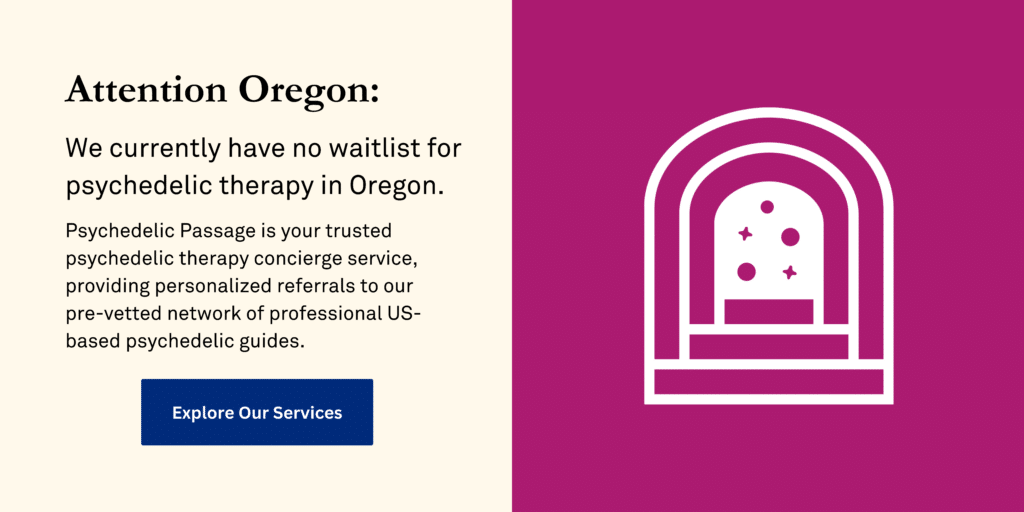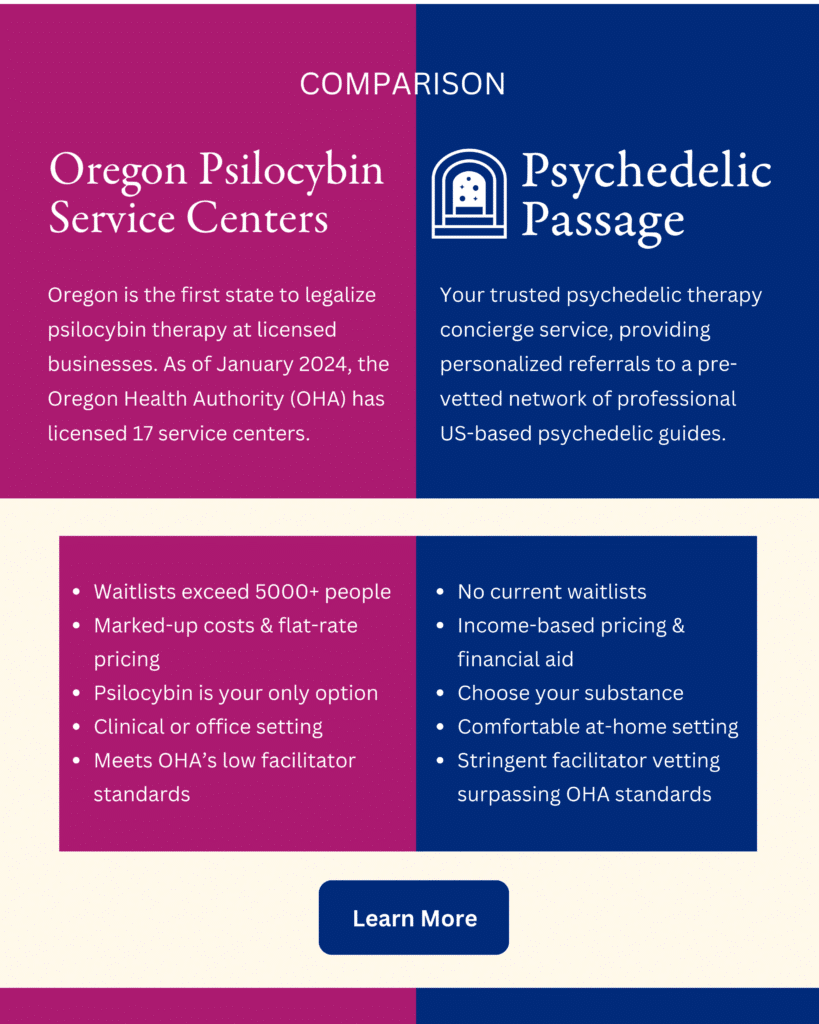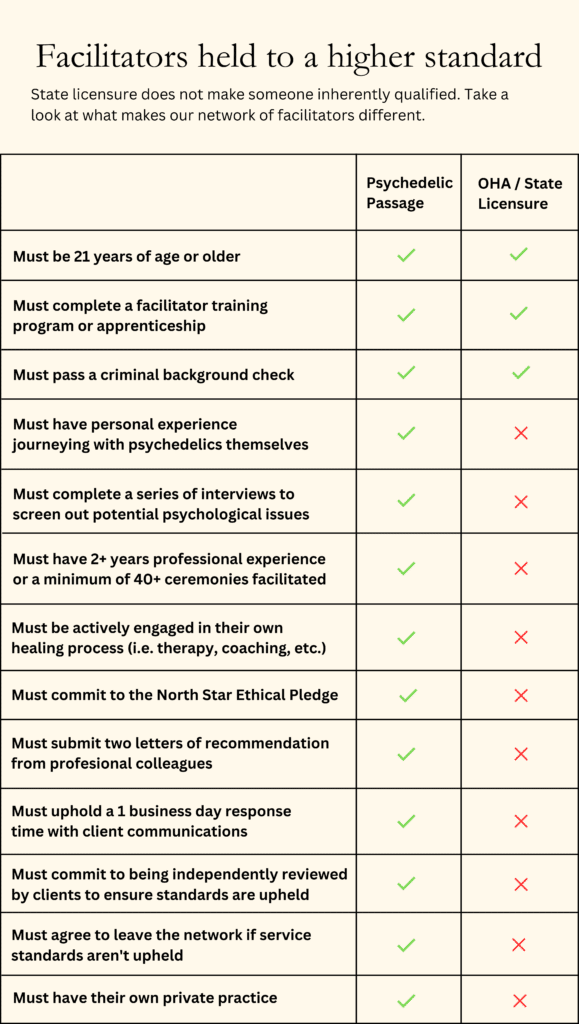Dear Oregonians, the state of Oregon is forging through a unique milestone not just in state history, but U.S. history as well. Prior to November of 2020, there were no laws in the country allowing for psychedelic therapy nor providing regulatory frameworks around such treatments.
But Oregon became the first to pass any law surrounding therapeutic psychedelic use, paving the way for a greater future in which these medicines are utilized for mental health crises (which are growing) in the country.
With Measures 109 and 110 being passed that year, a two year waiting period began, in which plans were made for state-licensure programs, including licensure for psychedelic facilitators, service centers, and manufacturing facilities for psilocybin.
While this milestone—which only allows for psilocybin use in licensed facilities—is a huge progressive step for the psychedelic movement, we can’t help but notice some holes in the new regulatory framework.
We believe that those living in the state of Oregon who are looking for psychedelic support should be informed of their options, and also aware of the potential drawbacks of going with state-licensed facilitators and service centers for their therapeutic psychedelic journey.
Key Takeaways
- There are particular drawbacks and oversights in Oregon’s regulatory framework for psychedelic therapy, and we believe you should be aware of those before making your decision for your journey.
- Long wait times and excessive costs mean that psychedelic therapy isn’t as accessible for most people, while low standards for licensure mean the quality of therapy provided in service centers may be low.
- You have other options for therapeutic psychedelic use which allow for greater accessibility, support, comfort, freedom, and ease of process while also at an affordable price.
- Psychedelic Passage: Your Psychedelic Concierge — The easy, legal way to find trustworthy psilocybin guides, facilitators and psychedelic-assisted therapy near you in the United States.
Availability of Psychedelic Therapy in Oregon’s Psychedelic Service Centers
Probably the most prominent challenge in accessing psilocybin therapy in Oregon is the extensive wait times at service centers. With the presence of 21 licensed centers, reports indicate some waitlists exceeding 5,000 individuals.
Despite the state’s effort to regulate and facilitate therapeutic psychedelic experiences, the demand has far outstripped the available resources within some of the most prominent service centers, resulting in extensive waitlists that can be detrimental to individuals seeking timely mental health support.
This overwhelming demand has created a bottleneck, leaving many prospective participants uncertain about when, or even if, they will receive the necessary treatment.
In numerous aspects, these waitlists are cause for much celebration and stand as a testament to the wise decision to legalize psilocybin therapy. Many of these service centers have effectively assisted numerous journeyers, and this is certainly a noteworthy achievement.
However, it’s crucial to highlight as well that, for those struggling with serious anxiety, depression, PTSD, and other mental health conditions, having access to timely treatment is of the utmost importance.
Especially given that those seeking psychedelic therapy usually do so because their conditions have been resistant to other treatment options, we believe supported therapeutic psychedelic use should be available to those suffering and in need of help.
That is why we are happy to report that in Oregon, Psychedelic Passage has no waitlists, and the process is straightforward, accessible, and offers a host of additional benefits in comparison to the state-regulated model, which we cover later in this article.
State Licensure Requirements for Facilitators
One other important element to be aware of is the extremely low requirements for licensure for those wanting to become psychedelic facilitators in Oregon, and these requirements (or lack thereof) were set by the Oregon Health Authority.
While Oregon has established itself as a pioneer in legalizing psilocybin therapy, the lack of stringent training requirements for facilitators within the state’s regulatory framework could cause a host of issues given that this work is incredibly sensitive.
The Oregon Health Authority (OHA) mandates basic criteria for obtaining a facilitation license, including being 21 years old, an Oregon resident, holding a high school diploma, passing a criminal background check, completing an Oregon Psilocybin Services training program, and passing an exam.
While essential, these stipulations may not be sufficient indicators of the facilitator’s competence, expertise, or the quality of the therapeutic journey they can provide.
It is crucial to recognize that many facilitators possess qualifications that much surpass the state requirements; however, this is not universal and certainly not the standard.
In contrast, Psychedelic Passage positions itself as an advocate for higher standards in the selection of facilitators.
Relying solely on state licensure may mislead individuals into assuming a level of competence that might not align with their expectations, and the absence of a requirement for facilitators to have personal experience with psychedelics in the OHA model is of particular concern.
This means that you as the journeyer may be facilitated by someone who has never even taken psychedelics themselves, which begs the question: how could someone help you navigate something they have never even experienced for themselves?
Lastly for this point, it is unclear how state-licensed facilitators are held accountable or how complaints are handled by the OHA regarding individual facilitators or service centers.
Psychedelic Passage seeks to address the potential limitations of facilitators who may guide others without having traversed the realms of psychedelic experiences themselves, and we hold each facilitator in our network accountable to a higher degree of practice and provision.
The Costs of Oregon Service Centers
Excessive costs associated with accessing psychedelic experiences through state-licensed service centers is a real issue. This section aims to elaborate on the financial challenges individuals may face when seeking therapeutic journeys within the current regulatory framework.
The breakdown of costs within Oregon’s service centers is presented as comprising three main components: the psilocybin itself, the service center room, and the facilitator fee.
While centers and facilitators are required to offer package deals covering minimal required preparation, administration, and minimal required integration, additional expenses may be incurred for more comprehensive support.
When it comes to general pricing, one example, Satya Therapeutics is mentioned for supposedly offering packages averaging around $1,250, with prices ranging from $800 to $2,800 for facilitation.
However, despite the lower cost, the accommodations may be compromised, highlighting the potential trade-off between affordability and the quality of the therapeutic setting.
Epic Healing Eugene, the first service center to open in Oregon, has more appealing accommodations but has a higher price point and waitlist exceeding 5,000 people.
Lucid Cradle is another higher-end option with access to nature and a private, spacious setting, however packages start at a substantial $10,000 for first-timers.
It is imperative to clarify that these challenges do not originate from the service centers or the facilitators themselves. The issue stems from the considerable costs associated with personal training and certification, with reports suggesting fees reaching as high as $12,000.
Additionally, service centers face mandatory annual fees, such as $10,000, and substantial expenses for insurance and security that can escalate to $60,000.
Pricing challenges encountered by service centers are a result of their inability to write off essential costs like rent and wages due to the illegal status of psilocybin under federal law.
The US tax code, particularly 280E, imposes restrictions on businesses dealing with Schedule I and Schedule II controlled substances, including psilocybin, denying them the tax benefits afforded to other businesses. Consequently, service centers are compelled to set prices approximately 30% higher to counterbalance these limitations.
To illustrate, if a service center charges $3,000, about $1,000 would be allocated to fulfill obligations to the federal government. Therefore, it is crucial to understand that these challenges do not arise from the service centers themselves but rather from the regulations they must adhere to.
However, this prompts a reflection on the accessibility challenges posed by high costs, potentially limiting the demographic that can benefit from psilocybin therapy, as well as the high costs for such minimal accommodations.
In comparison, Psychedelic Passage positions itself as an alternative with more affordable options, and you can check out our ceremonial pricing here, with sliding scale pricing and scholarships available for those in need. We also offer a supportive microdosing program as well.
Choice of Setting & Psychedelic Substance for Psychedelic Therapy
When it comes to setting and substance, the OHA limits therapy to only a particular mushroom strain (Psilocybe cubensis) and administration to take place only in licensed service centers.
This means that other mushroom strains and other types of psychedelics like MDMA, LSD, and ayahuasca (which are all being shown to have therapeutic benefits along with magic mushrooms) are prohibited in Oregon service centers.
Furthermore, the service centers themselves—with 21 available in the state currently—often have what some describe as “a clinical feel” or limited comforts, privacy, and ambience. As discussed before, many of the decent options come at a high price point.
For some, being in a clinical setting is a source of comfort and confidence. For others, is can have the opposite effect.
With Psychedelic Passage, you have the option of journeying in the comfort of your own home or any chosen location that is private, scenic, and feels right for your experience. The choice of substance is also in your hands, whether that be a particular psilocybin strain or another psychedelic altogether.
Each highly qualified facilitator in our network works with you to find the optimal setting, dosage, and substance, guiding you throughout the entire process but ultimately honoring your personal freedom of choice.
Download Our Free Psilocybin Sourcing Guide
For harm-reduction purposes, we provide links to online psilocybin vendors, local stores, delivery services, and spore vendors for growing your own medicine at home.
OHA Facilitator Licensure Requirements
One important thing to know when doing your research on OHA regulations is that licensed facilitators are not required to be licensed therapists. While many facilitators—both state-licensed and within our network—do hold licensure as mental health social workers or therapists, it isn’t required.
We want to clarify that our concern is not aimed at crediting the value of a facilitator to mental health licensure. Proficiency varies across all professions, and the same holds true for licensed therapists.
Just as there are excellent and mediocre doctors despite having a medical license, mental health licensure doesn’t automatically translate to effective facilitation skills. Our primary concern lies in the absence of crucial barriers and qualifications within the Oregon Health Authority program for psychedelic facilitators.
Some barriers include personal and professional psychedelic experience, and psychological evaluation, neither of which are required for facilitator licensure by state law.
This means that the job of vetting prospective guides really falls on you, the journeyer, since the OHA’s requirements are so low. We recommend that, should you go the service center route, you make sure your facilitator holds greater levels of qualifications that exceed the state requirements.
We strive for a greater standard for vetting facilitators, and this helps ensure the safety and satisfaction of our clients. While we don’t require facilitators to be licensed therapists either, we do have higher standards for acceptance into our network, and many of them are licensed therapists anyway.
Lastly, be sure to know how to distinguish between a good service center and a good facilitator. Just because there are great reviews for a center doesn’t mean that every facilitator working within that location is going to be qualified or right for you.
If you journey through a service center, it’s important to do your research on both the center and facilitators available at any given location, and that there is a certain degree of transparency around reviews and feedback.
With Psychedelic Passage, you get the benefit of psychedelic therapy AND a framework that is more quality-controlled, because the people that created the network and the programs, our co-founders Nicholas Levich and Jimmy Nguyen, were actually facilitators first and know the ins and outs of the process.
Our Vision for Ethically Competitive Psychedelic Therapy
Let us be unequivocal: Our objective is not to vilify the centers in Oregon; instead, we earnestly anticipate improvements in the state’s regulatory framework, viewing them as a potential model for the broader adoption of psychedelic therapy in the United States.
The reality is that most of the 715 individuals who availed themselves of regulated services last year likely experienced some form of benefit or positive support.
While acknowledging Oregon’s pioneering role in setting standards for psychedelic therapy, it is imperative to recognize the repercussions of current practices. Our duty is to fill gaps in awareness. We genuinely commend Oregon for being a trailblazer, serving as a guiding influence for others.
However, reveling in achievements should not obscure the necessity of addressing areas requiring improvement—areas that we, ourselves, have scrutinized and refined. Our goal is for the entire industry to transform into a realm of ethical competition.
We posit that achieving this transformation demands open discourse, constructive criticism, and collaborative endeavors to elevate standards. This is why we are committed to continually educating the public about our services, empowering them to discern the industry’s pitfalls by comparing them to higher benchmarks.
Speak With a Trusted Psychedelic Therapy Provider Today
Hi there! We sincerely hope that you’ve found valuable takeaways that resonate with your current intentions. To explore research-based education, stay updated with psychedelic news, and benefit from practical how-to articles, we encourage you to head over to our resources page.
If you’re seeking personalized advice and are prepared to take the first step toward a therapeutic psychedelic experience, we invite you to book a consultation with our team of experienced psychedelic concierges.
This consultation is more than just a conversation; it’s an opportunity to be matched with a trustworthy local facilitator. You’ll be seamlessly connected to our rigorously vetted network of psychedelic guides, ensuring potential matches align with your needs.
Psychedelic Passage offers confidence and peace of mind by alleviating the burden of having to guess who’s right for you. If you want to discover how Psychedelic Passage can help you, we empower you to learn more about our services and check out client testimonials from those who’ve gone before you.
Your healing path is uniquely yours, and our commitment is to serve you at every juncture. Psychedelic Passage: Your Psychedelic Concierge — The easy, legal way to find trustworthy psilocybin guides, facilitators and psychedelic-assisted therapy near you in the United States.
Learn More About Our Network
Frequently Asked Questions
1. What is the cost of psilocybin therapy in Oregon?
Costs include facilitator services, service center room fees, and the price of psilocybin. On average, basic accommodations and service packages may cost around $1200 to $1500 but range anywhere from $800 to $10,000.
2. How long are waitlists in Oregon’s service centers for psychedelic therapy?
Wait times can be significant due to limited space availability. Some centers have a maximum capacity of 20 sessions per month, leading to extended waitlists of 3,000 to 5,000 people.
3. Is preparation and integration included at Oregon’s psychedelic service centers?
According to the OHA, preparation involves one to two sessions prior to the journey, with integration being optional or offered as a single session. Requirements are relatively low with additional options available at an added expense.
4. How many psilocybin service centers are open in Oregon?
Currently, there are 17 service centers open in Oregon, and these are located throughout the state. Many service centers have extremely long waitlists due to the limited number of resources available and high demand for the service.
5. Are psychedelic facilitators in Oregon qualified?
Facilitators are required to meet basic requirements, including being 21 years old, an Oregon resident with a high school diploma, and completing an Oregon Psilocybin Services training program. Personal or professional experience with psychedelics is not required.
Connect With Psychedelic Passage
-
- Listen to our podcast on Spotify, Apple Podcasts, and iHeartRadio
-
- Subscribe to our Youtube Channel






